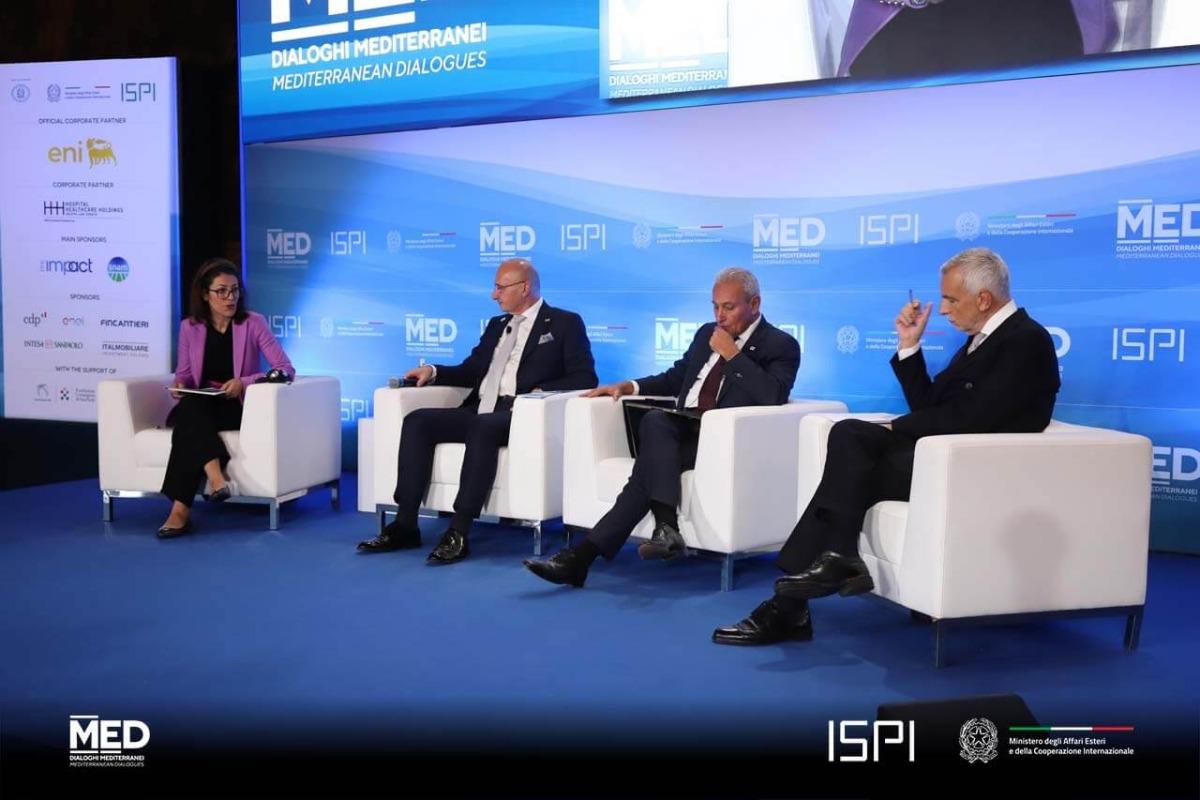
Europe And The Mediterranean: A Shared Destiny In Fragmented World
Naples: As global tensions redefine alliances and reshape power balances, the bond between Europe and the Mediterranean has re-emerged as a cornerstone for stability, development, and dialogue. This was the central message at a special session titled“A Shared Destiny: The EU and the Mediterranean in Transition,” where senior diplomats, policymakers, and experts discussed the European Union's ambitious plan to relaunch Euro-Mediterranean relations through a new Pact for the Mediterranean.
During the 11th Mediterranean Dialogue 2025 held at Naples, speakers reflected on the“inextricable link” that binds the northern and southern shores of the Mediterranean - a relationship first recognized in the EU's 2021 Agenda, but now more crucial than ever amid global instability and polarization.
Moderated by Sara Bazoobandi, Research Fellow at the GIGA Institute of Middle East Studies and ISPI, the panel included Croatia's Minister of Foreign and European Affairs Gordan Grlić-Radman, Secretary General of the Mediterranean (UFM) Nasser Kamel, and Director-General for the Middle East and North Africa at the European Commission Stefano Sannino.
Together, they explored how Europe and its southern neighbours can transform their long-standing partnership into one of mutual growth and shared responsibility.
“The European Union must speak with one voice,” said Grlić-Radman.“Whether it is in Ukraine, the Middle East, or the Mediterranean, our strength lies in unity and readiness. The forthcoming Mediterranean Pact reflects our unanimous approach to building a stable and prosperous southern neighbourhood.”
The new Pact aims to deepen cooperation between the EU and its Southern Neighbourhood through pragmatic, result-oriented measures. Unlike previous initiatives, this plan is rooted in shared responsibility - a partnership among equals rather than a donor-recipient model.
Sannino explained that the proposal emerged from extensive consultations with governments, civil society, and academia across the Mediterranean.“We listened to their concerns and aspirations,” he said.“The outcome is a comprehensive action plan to be co-managed by the EU and southern partners - focused on education, job creation, and cultural exchange.”
He stressed that the new approach was“not just a statement but a vision - a practical roadmap” designed to create better conditions for growth and sustainability across the region.
Speakers emphasized two pillars at the heart of the new vision: connectivity and resilience. Connectivity encompasses not only energy and infrastructure, but also education, research, and digital cooperation.“We must connect economies and societies,” said Sannino,“through trade, innovation, and shared resilience.”
Resilience, meanwhile, involves addressing the region's most pressing challenges - from the accelerating effects of climate change to post-crisis recovery in Gaza and Syria.“We can no longer rely on traditional approaches,” one panelist noted.“We need a forward-looking framework that strengthens civil protection, builds social trust, and ensures long-term stability.”
The upcoming Barcelona Ministerial Meeting on November 28 will serve as a key milestone, where European and Mediterranean leaders are expected to endorse this new strategic vision and action plan.
Minister Grlić-Radman reiterated Croatia's commitment to advancing Mediterranean cooperation as his country prepares to assume a leading role next year.“Our presidency will focus on peace, stability, and energy unification,” he said.“Through initiatives like the Three Seas project, we aim to strengthen infrastructure, digitalization, and connectivity from the Baltic to the Adriatic and the Black Sea.”
He highlighted that Croatia, together with partners such as Germany and the United States, supports regional energy independence and is working toward new educational and cultural collaborations - including the establishment of a Mediterranean university network to foster dialogue and innovation.
Looking ahead, participants agreed that the goal is not only economic integration but also cultural and social cohesion.“Our past initiatives were institutional,” said Kamel,“but the new vision must be human-centered. We must build an integrated Mediterranean economy that values sustainability, inclusivity, and partnership.”
As the session concluded, the message was clear: Europe's destiny is inseparable from that of the Mediterranean. In an era defined by division and uncertainty, the new Pact represents a renewed commitment to cooperation - a shared promise to turn the tides of fragmentation into a future of common purpose, peace, and prosperity.

Legal Disclaimer:
MENAFN provides the
information “as is” without warranty of any kind. We do not accept
any responsibility or liability for the accuracy, content, images,
videos, licenses, completeness, legality, or reliability of the information
contained in this article. If you have any complaints or copyright
issues related to this article, kindly contact the provider above.
Most popular stories
Market Research
- Thinkmarkets Adds Synthetic Indices To Its Product Offering
- Ethereum Startup Agoralend Opens Fresh Fundraise After Oversubscribed $300,000 Round.
- KOR Closes Series B Funding To Accelerate Global Growth
- Wise Wolves Corporation Launches Unified Brand To Power The Next Era Of Cross-Border Finance
- Lombard And Story Partner To Revolutionize Creator Economy Via Bitcoin-Backed Infrastructure
- FBS AI Assistant Helps Traders Skip Market Noise And Focus On Strategy




















Comments
No comment